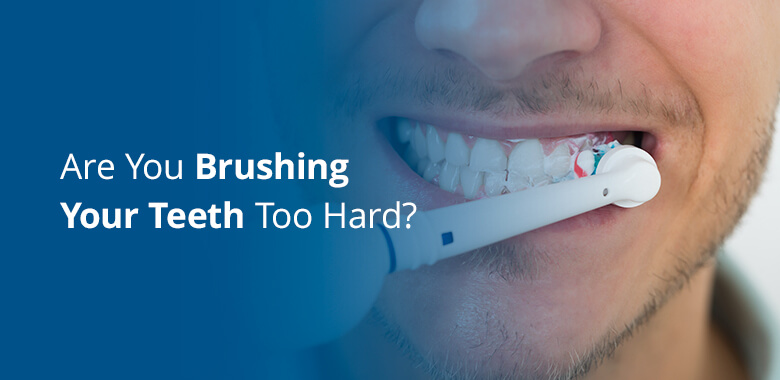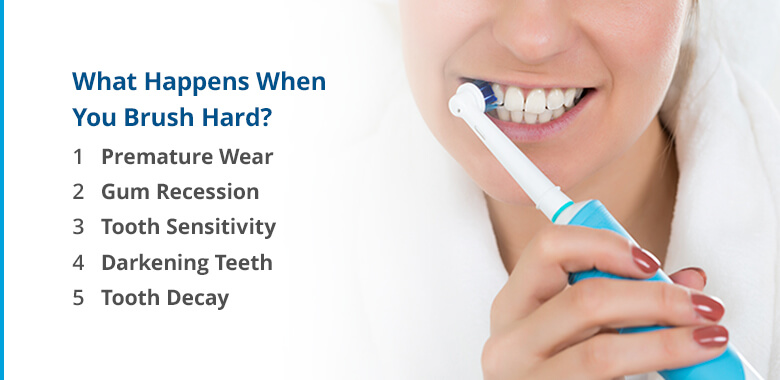
If you’re like most people, you probably brush your teeth without considering things like your technique or bristle stiffness. You should brush twice each day to maintain good oral hygiene, and the process becomes habitual, making it difficult to change your usual routine if you need to improve your habits. If you are brushing your teeth too hard, you could experience negative consequences.
Learn how to tell if you’re brushing too hard and about good brushing techniques.
What Happens When You Brush Hard?

How is brushing your teeth too hard a bad thing? This is a poor oral hygiene habit that can lead to health consequences if it continues. Toothbrush abrasion from overbrushing, prolonged brushing, or a heavy-handed technique causes enamel loss and several troubling symptoms.
The following problems are the effects of brushing too hard:
1. Premature Wear
Can brushing your teeth too hard damage enamel? One of the first issues that aggressive brushing causes is wear on the protective outer coating of your teeth. Even healthy enamel can get scratched and erode from the abrasion that brushing too hard causes. If the enamel is significantly damaged, the tooth tissue cannot heal, leading to tooth decay and an increased risk of cavities.
2. Gum Recession
With firm, repetitive brushing, your gums can gradually start to recede. Receding gums can make your smile look less healthy, and the cementum — the hard, calcified layer of your teeth covering the sensitive root — can wear away, leaving lasting damage. The roots are more sensitive and decay easier. Once the cementum of the teeth is exposed, you may experience gum sensitivity and pain.
3. Tooth Sensitivity
As the enamel layer of the teeth wears away, the lasting erosion will cause symptoms like sensitivity to heat and cold. The roots of your teeth are full of nerves, making them sensitive to stimuli. With the outer layers of your teeth rubbed away, you may feel an uncomfortable sensation whenever you eat or drink something especially cold or hot. This symptom could also be a sign of tooth decay.
4. Darkening Teeth
Too much scrubbing can also make your teeth look darker, especially under the gums. Your teeth’s roots don’t have enamel, so if your gums recede from abrasive brushing, your teeth may start to look less white as they gradually take on a stained appearance.
5. Tooth Decay
Brushing too hard can rub away at your enamel layer until the soft dentin tissue is exposed, which will make it easier for bacteria to eat away at your teeth. Hard brushing also leaves your roots vulnerable.
Once the abrasion from your toothbrush wears away the enamel layer, the damage to your teeth is irreversible. Fortunately, treatment options are available for correcting abrasion and resulting tooth decay.
How to Know if You Are Hurting Yourself While You Brush
Most people who brush too hard do it unintentionally and are unaware of how much abrasion they are creating. Overbrushing your teeth involves brushing too often and using too much force. If you brush your teeth compulsively, you may also use forceful, vigorous movements, which can put your oral health at risk.
You may need to change your oral hygiene habits if you notice these signs of brushing teeth too hard:
1. Your Gums Bleed
You might notice your gums occasionally bleed when you brush or floss your teeth. Although gums bleeding regularly is abnormal, occasional bleeding is a very common issue that nearly everyone will experience at some point. If your gums frequently bleed, it might be because you are applying too much pressure when you brush. Bleeding gums may also be a sign of gingivitis or another issue with your oral health.
2. Your Teeth Are More Sensitive Than Usual
If you regularly brush too hard but otherwise have good oral hygiene practices, you might notice some sensitivity as your enamel wears down from the aggressive strokes of your bristles.
Your teeth lose structure as mechanical forces strip the enamel, leaving the underlying nerve endings closer to the surface. The resulting sensitivity feels uncomfortable or painful, especially in response to hot or cold foods and beverages. Sweet and sour foods may also trigger a strange or unpleasant sensation in your teeth.
3. Your Teeth Appear Longer
Receding gums from improper brushing can make your teeth appear longer. This may be difficult to identify if your gums have only started to recede. A dentist can identify this problem more accurately, which is why it’s important to see your dentist regularly.
Your gums may also feel more sensitive or painful when the roots are exposed. If you have frequent, lasting gum sensitivity, talk to your dentist.
4. Your Teeth Have Dull Spots or Appear Gray
Abrasion on your teeth can make them appear dull or stained once the enamel layer is damaged. Using your toothbrush too enthusiastically can form shiny yellow or brown spots on your teeth. The abrasion is usually easiest to notice near the gumline but can occur anywhere on your teeth. If the abrasion continues, the worn areas will grow in size until the entire tooth has dulled.
5. Your Teeth Have Notches
Abrasion on your teeth can also create notching, which looks like a wedge or small indention along your gumline. Notches are usually V-shaped and result from your bristles landing repetitively in the same area. You might be able to feel a notch with your tongue. Notched teeth often have gum and tooth sensitivity.
How to Properly Brush?
You can prevent brushing too hard and keep your mouth healthy by using:
- A soft-bristled toothbrush: Stiff bristles create more mechanical friction and abrasion. Soft bristles are strong enough to clean your teeth effectively.
- A gentle toothpaste: Some toothpastes have abrasive cleaning agents. Use fluoride toothpaste with calcium to preserve and strengthen your enamel.
- Good brushing technique: If the bristles of a new toothbrush look frayed and flattened after a week of brushing, you need to relax the pressure you’re placing on the brush.
- A toothbrush at the right times: Instead of brushing immediately after you finish eating, try to wait an hour.
- A toothbrush at a healthy frequency: Although many people brush too little, it is possible to brush your teeth too frequently. Instead of brushing every time you eat or drink something, drink plenty of water and chew sugar-free gum when you want to freshen your breath.
- Teeth for eating only: Avoid using your teeth to bite your fingernails, open bottles and wrappers, cut tape, or hold hard objects like nails while you work. These habits can lead to abrasion, worn enamel, and chipped teeth.

Schedule a Consultation With AZ Family Dental
If you’re experiencing symptoms of tooth damage from brushing too hard, AZ Family Dental can help. We also offer preventative care services and information so you can avoid issues like tooth decay in the healthiest ways. Contact us to schedule your consultation or if you have questions about our services.
